The Global Tech Talent Trends 2023 — Portugal, kindly sponsored by Reaktor, is finally out and it has some insightful data on the tech careers in Portugal.
Fact: the past few years have been crazy. Remote work has gone from optional to must-have for professionals, reshaping how we work, how professionals look at a prospective new job, and how companies hire and retain talent.
Working from home, hiring and working across borders or relocating to another country are no longer exceptions or possibilities, but are now proven trends and, in some cases, important details to make the best hires.
This doesn’t mean that companies now have all the talent to hire. On the contrary, there’s a major shortage of tech talent, making things harder. In fact, the shortage of tech talent worldwide is now bigger than ever, and not only does it have a massive impact on the tech job market, but it’s contributing to a shift in how tech recruitment is being done.

The exclusive release of the Global Tech Talent Trends 2023 – Portugal, at Reaktor’s office in Lisbon
So, in times like this, where factors like work-life balance, career progression opportunities, salary and benefits, cultural fit or learning and training programs are some of the most valuable aspects for professionals when considering a job, how can companies keep up? And what can professionals expect from the tech job market?
Landing.Jobs surveyed more than 7000 people across the world and the insights about the current tech job market are very interesting, but today let’s focus on what the report uncovers about the tech market in Porutgal.
Tech careers in Portugal: a complete overview of the highlights and trends
The Global Tech Talent Trends includes global coverage of the tech job market. Divided into demographics, professional roles, tech stacks, remote and global work, career management and salary & perks, the report aims to “provide insights that allow tech professionals to make more informed career decisions from a global perspective and help companies grasp the new nature of the global tech market and how they should position themselves to hire and retain the talent they so desperately need”.
“With the mass adoption of remote work, geographic and cultural barriers disappeared, allowing tech talent to work remotely not just for Portuguese companies but also for companies across borders”. (…) foreign companies saw this as an opportunity and made aggressive moves in hiring Portuguese tech talent to work remotely from Portugal. If last year’s percentage of Portuguese professionals working remotely across borders was impressive (18.6%), this year, that feeling is exacerbated (22.6%).”
However, this has an impact on the Portuguese job market, as it’s been causing quite a stir in “both the availability of local talent and on the salaries, something local companies are starting to realise”. Portuguese companies still have a long way to go, with only 10.6% of the Portuguese workforce coming from other countries.
Demographics
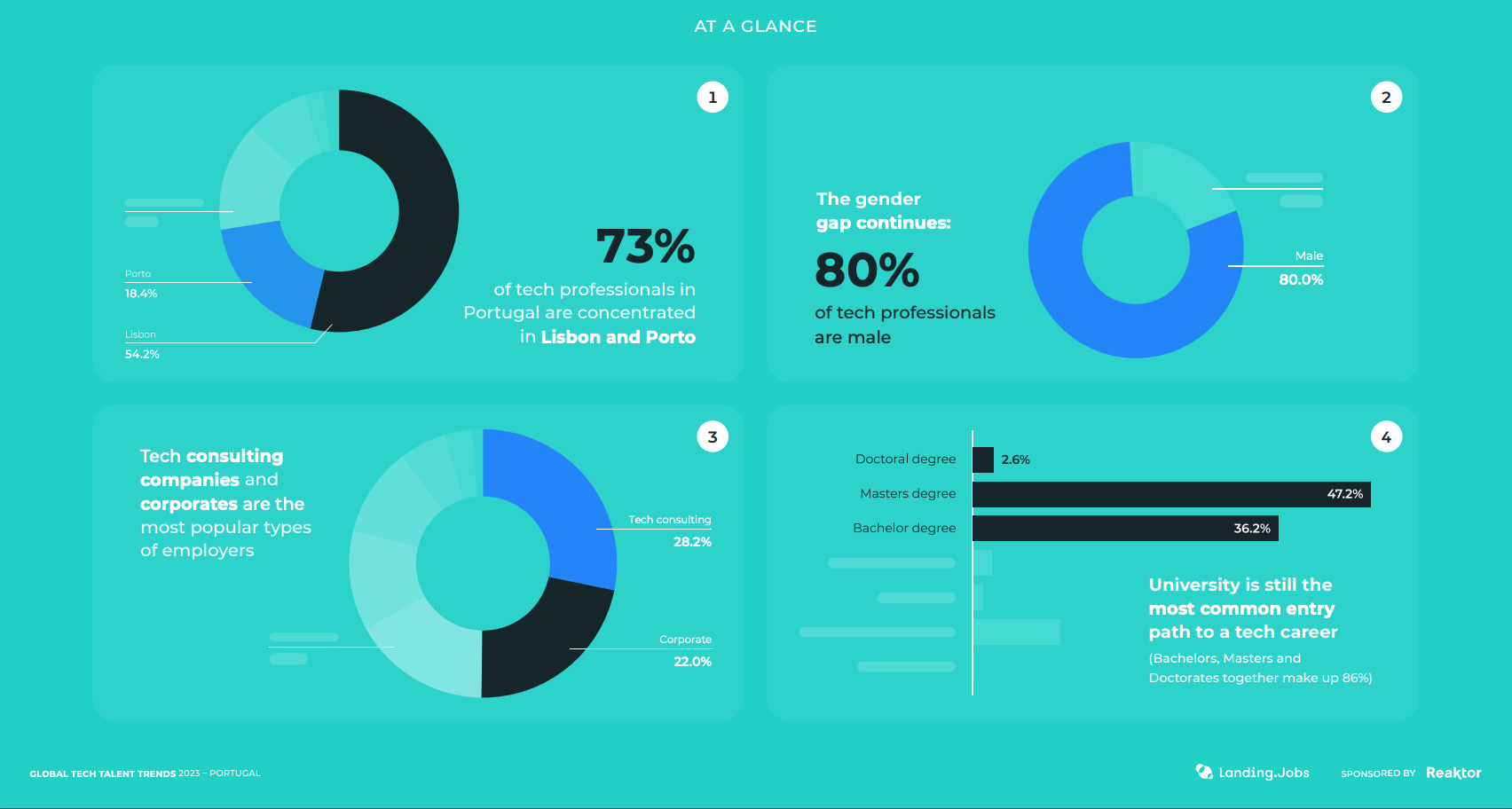
This is still an issue, because yes, the gender gap is still a thing, when talking about tech careers in Portugal, but also worldwide. According to the data in the report, 80% of tech professionals are male.
Also, 73% of the tech professionals are located in Lisbon and Porto. The centre region comes next with 14.5%.
Most tech professionals work in tech consulting (28.2%) and corporate services (22%), which represents an increase of +3.1% when compared to last year’s report. Startups are losing professionals, having registered only 12.1% of the tech professionals (in 2022 it was 14.9%).
Professional roles & technology
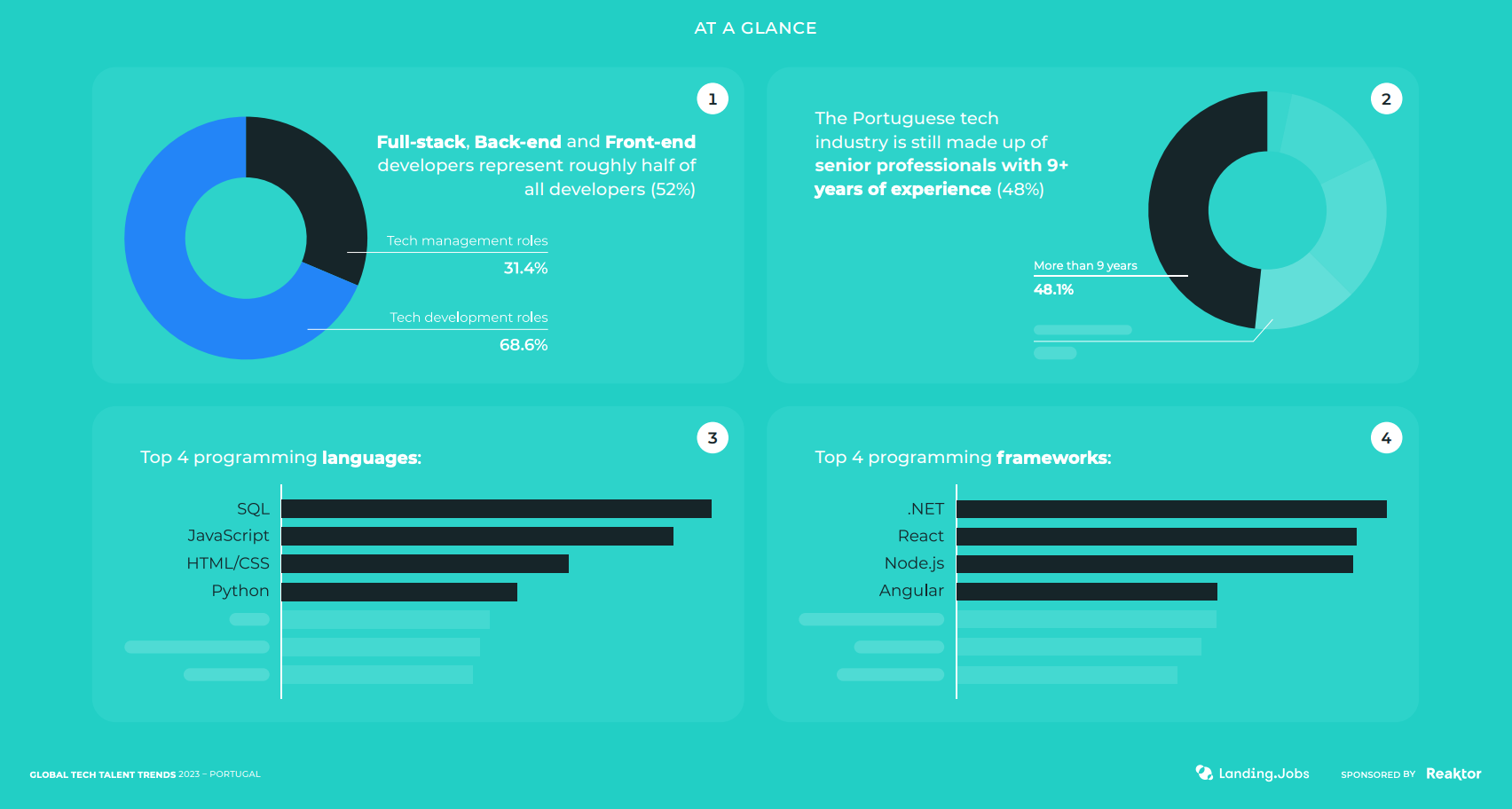
The data is clear and it keeps following the trend from 2022. Full-stack, Back-end and Front-end developers continue to represent roughly half of all developers. The surprise in this year’s report is for Data Scientists/Engineers who are passing “Front-end in market share, signalling a progressive rise of this job category in the IT landscape”. Blockchain/Web3 developers appear for the first time on the report, making them something to keep an eye on.
Project Managers, Solution Architects and Business Applications engineers are losing ground when it comes to the market share of job roles.
Senior professionals, with 9+ years of experience, are still leading the tech job market, however, compared to last year, junior (1-3 years) and intermediate (3-6 years) professionals are now registering an increase in their market share, “signalling a most welcome influx of new people in the market”. “Seniors (6+ years of experience) make more than 61% of the total, proving a high degree of maturity in the Portuguese IT workforce”, the report shows.
When considering languages and programming frameworks, the data is almost the same as last year’s report, with SQL, Javascript, HTML/CSS and Python leading the charts. “Python continues to be the top language amongst ‘generic usage’ languages”, with Python (+1%) and Go (+0,5%) being the languages with the largest increase in market share YoY.
However, it is important to note that Typescript and Java keep growing (+0.2% each) and on the downside, C# and PHP decreased their importance (-0.4% and -0.3%, respectively).
Remote and global work
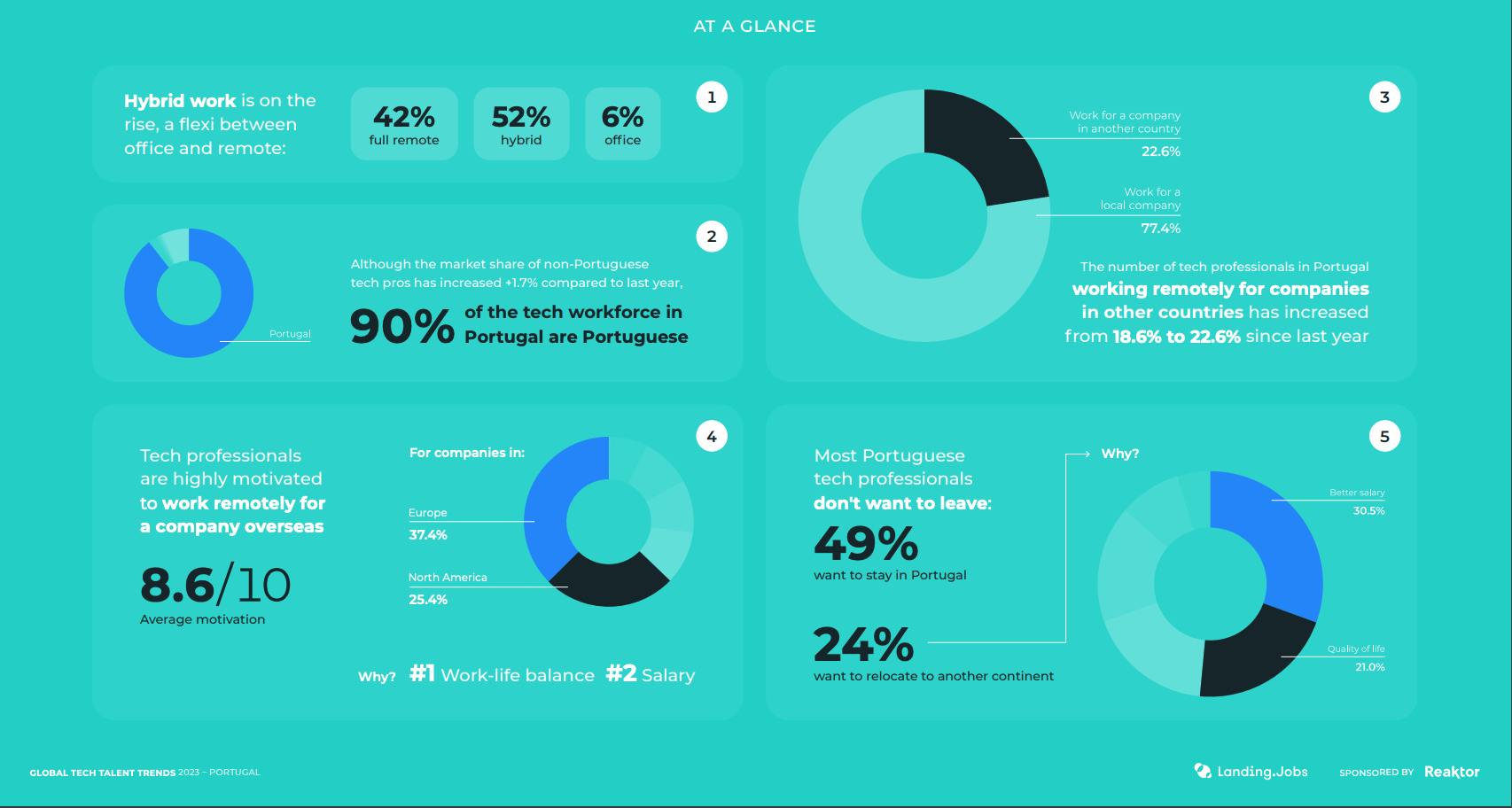
This is still a hot topic for tech careers, whether we’re talking about the Portuguese reality or globally.
The data displayed in the report shows that “Hybrid work is on the rise, a flexi between office and remote”, with 52% of the tech professionals working in a hybrid system. 43% of the professionals are in full remote work mode and only 6% have to go to the office every day.
“The hybrid (flexible between remote and office) option has increased in comparison with full remote (a gap of +10%), maybe signalling the will of some companies and tech professionals to adopt work methods that favour flexibility, but also provide some human contact. This is particularly important for the onboarding of newbies and recently hired tech professionals.”
Also, the number of tech professionals in Portugal working remotely for companies in other countries has increased from 18.6% to 22.6% since last year. Still, 77,4% of the professionals work for a local company.
The inquired professionals revealed that the level of motivation to work remotely for a company overseas is very high (8.6 out of 10). However, the majority still want to stay in Portugal (49%), with 24% wanting to relocate to another continent.
Of the 22.6% of Portuguese tech professionals who are working remotely for companies cross-borders, most are doing so for European countries (71.6%): mainly UK and Germany, followed by the United States. This happens due to “the possibility of combining higher salaries, better work-life balance and challenges, and not needing to relocate to another country are fueling this growing trend”.
Given the tech talent shortage Portugal is currently facing, the market share of non-Portuguese tech professionals in Portugal has increased (+1.7%), which now represents 10.6% of the total IT workforce. This is particularly important data as companies need to start rethinking their recruitment strategies and embrace the globalisation of tech to survive.
“Work-life balance is (still) the top reason to work remotely across borders”, the report shows, with 25.7% of the tech professionals mentioning this as a major reason for wanting to work remotely for a company outside the country.
Then the full list of motivations is clear:
- 23.5% better salary & perks
- 14% working for international companies
- 12.6% work from anywhere they want
- 12.4% finding better jobs
- 6.4% saving money
Career management
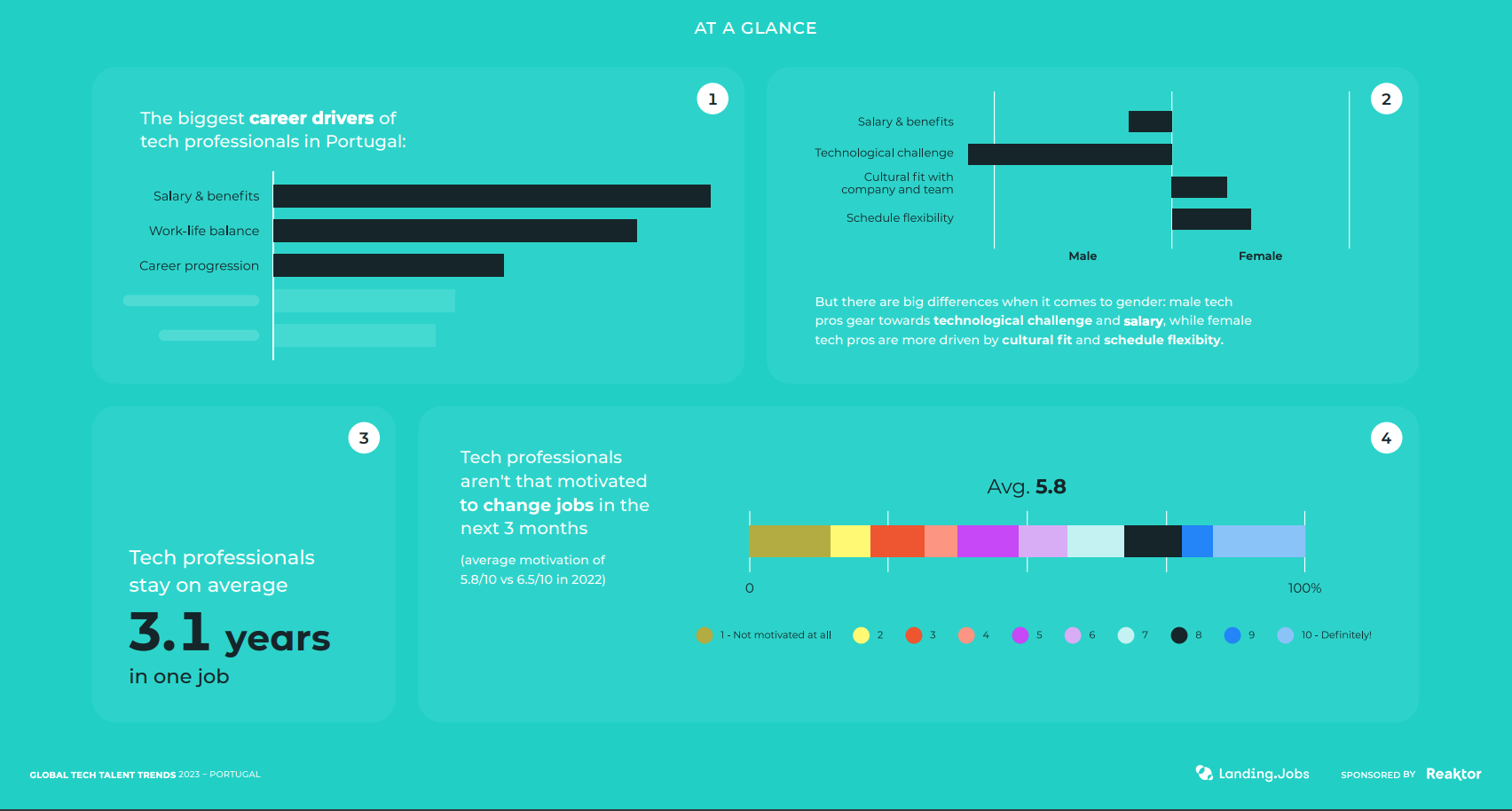
Salary and benefits are taking the lead, followed by work-life balance and career progression as the career drivers of tech professionals in Portugal.
However, there are differences when it comes to gender, with male tech professionals gearing towards technological challenge and salary, while female tech professionals tend to be more driven by cultural fit and schedule flexibility, important details to keep in mind as these pattern differences are important to manage diversity well.
Tech professionals stay, on average, 3.1 years in one job (which represents an increase of 2.9 when compared to 2022). The average job permanence ranges from 1.7 years for professionals between 1-3 years of experience, to 3.8 years for professionals with 9+ years of experience. This might have a correlation with family status, as the data shows that professionals with children have job permanences of 3.7 to 3.8 years, while those who are not parents have been in their current jobs between 2.5 to 2.7 years.
Interesting to note is that tech professionals in Portugal are less motivated to change jobs than in 2022 (average motivation of 5.8/10 vs 6.5/10 in 2022), this might happen due to the current economic and geopolitical situation.
Salary and perks
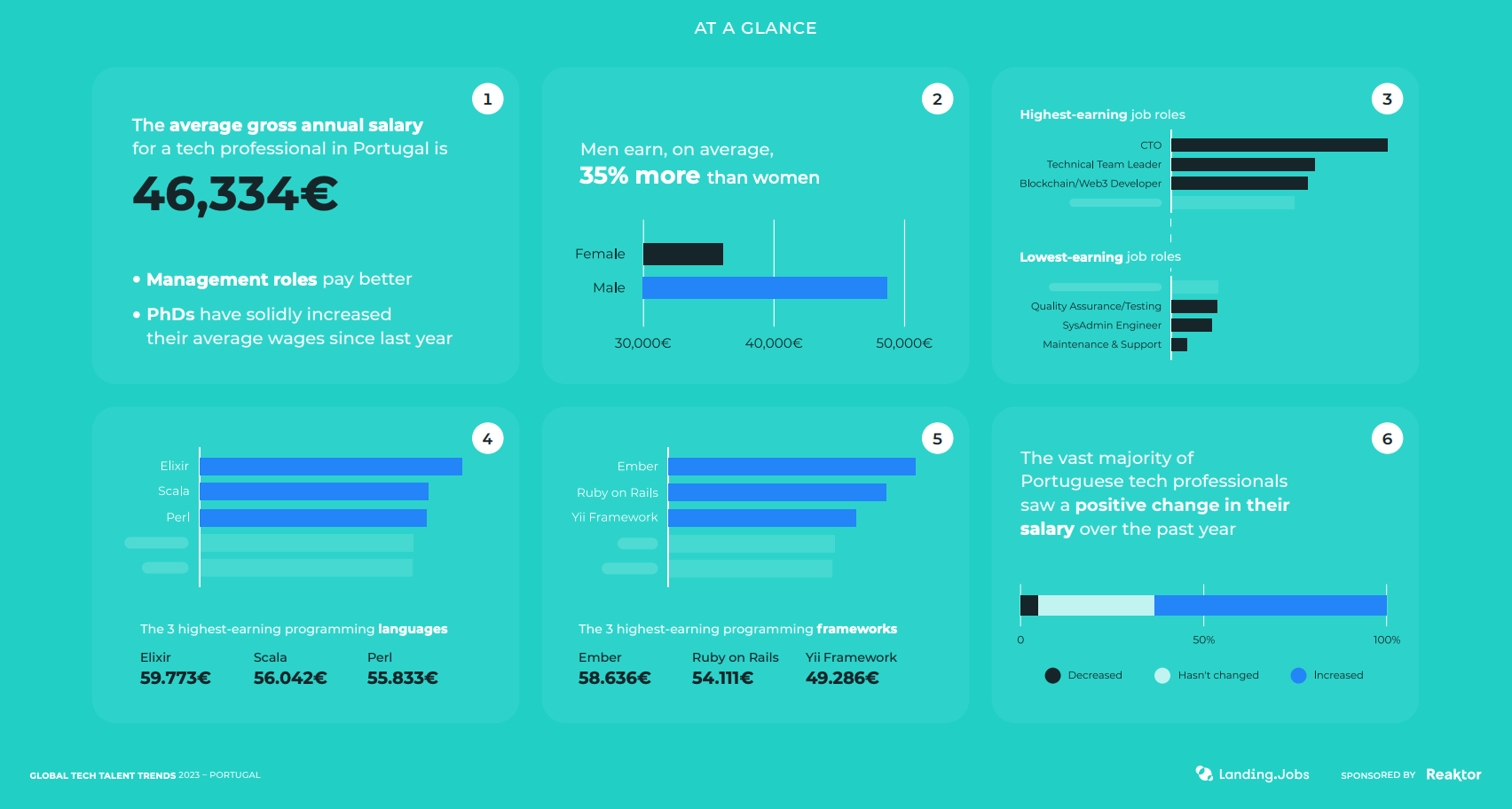
Health benefits (21%), annual Bonus (20.7%) and training sponsorship (15.1%) are the most relevant job perks, showing a clear pattern of what companies should focus on to please tech talent. These are followed by: computer/equipment allowance (13.3%) and company stock options (8.2%).
Also, the average gross annual salary for a tech professional in Portugal is 46,334€, with management roles being better paid and PhDs having solidly increased their average wages since last year.
Salaries in Lisbon metropolitan area are 8% higher than the rest of the country, however, these are the ones with a lower increase year on year (+3.2% vs +4.2% for the country average) and the North region has the largest increase YoY, with +11% gross annual salary increase.
Following last year’s trend, hybrid and fully remote tech jobs are paying better, as well as foreign companies.
“The difference in average salary between companies located in another country versus local companies is staggering (+60.8%, it was +46.8% in 2022).”
Tech management roles pay more, with Tech Team Leaders earning 15.1% more, followed by Scrum Masters (+18.4%) and Back-end Developers (+17.9%). On average, tech management roles earn 35.4% more than developers, with juniors with less than 3 years of experience being the worst paid.
The gender gap is still a reality here, with men earning, on average, 35% more than women in tech. This is even bigger in management roles (47.4%) than in development roles (29.3%). This is not good news considering that the gender salary gap has been getting worse since 2021. And to make things even worse, some of the highest-paying company types are also the ones with the highest gender pay gap. Which is weird, considering these are the ones usually boasting about diversity and inclusion.
The data shows that:
- Scale-ups have the highest gender pay gap (57.3%, which is 17.1% higher than last year).
- Public/Government/R&D, Startup and Corporate gaps went from 38% to 44%.
On a more positive note SMEs (-22.5%) and Local Outsourcing (-18.9%) registered a reduction in this gap and local outsourcing companies are the only cases where women earn more than men (4.7%).
Still a lot to be done!
Keeping up with the tech careers movement and getting the best out of it

The exclusive release of the Global Tech Talent Trends 2023 – Portugal, at Reaktor’s office in Lisbon
Whether you’re a professional, a company or a recruiter, one thing is certain: the tech job scene is a jungle and being equipped with the most up-to-date data on it is a clear advantage to make better-informed career decisions.
It’s essential for you to be aware of the changes and trends going on, and while this blog post gives you an overview, looking at the full report will give you a more detailed outlook.
About our sponsor, Reaktor 💙
Reaktor is a global technology consultancy that designs and builds category-defining digital products and services. They’re a team of 700 designers, developers, and strategists with offices in six countries around Europe, North America, and Asia. Reaktor Lisbon opened its doors in 2021.






0 Comments